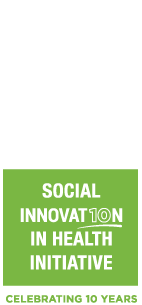For all those passionate about social innovation in health
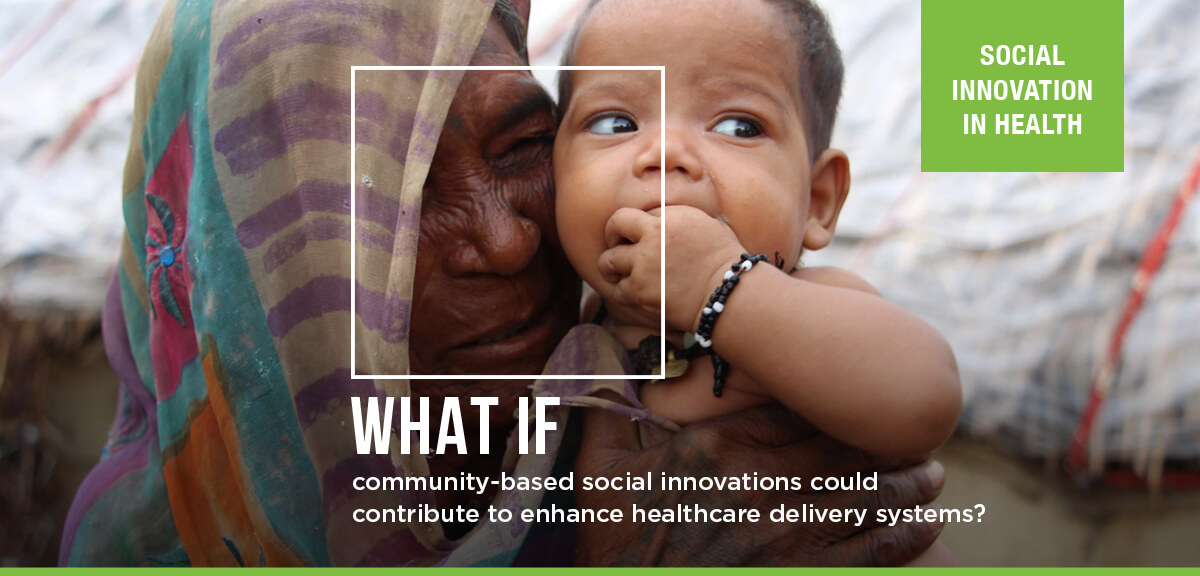
FOR ALL THOSE PASSIONATE ABOUT
SOCIAL INNOVATION IN HEALTH
Our passion for social innovation has brought us together. A global community of people from different backgrounds and countries. Each with an idea to share. With this newsletter, and those to follow, we want to continue uniting the change-makers – the innovators, policy-makers, donors, researchers and people at grass roots level. We will do this by featuring projects that inspire our mission and content that will motivate action.
One thing we’ve learned is that the world needs more people like you. Because you have something unique to offer: your point of view. Therein lies the beauty of seeing the world from a different angle. Whether you are a cleaner, doctor, government official, scientist, researcher, funder or patient, you have an idea to bring to the table. And with your help, we can find simple solutions for the greatest health challenges STARTING in the Global South. This is your platform to facilitate change. Let’s start sharing.
OUR JOURNEY SO FAR
By Dr Lindi van Niekerk
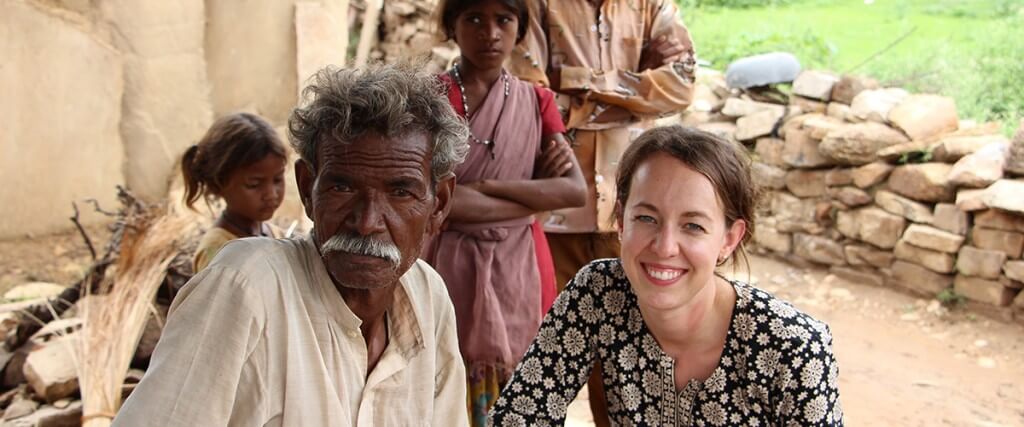
Earlier this year we announced the chosen 25 social health innovators and, although we’ve been keeping a low profile, much has happened since then.
We hit the road, embarking on an amazing journey that took us across 3 continents, 17 countries and 25 projects. From Bangladesh to Brazil. We visited homes in urban Kampala and rural clinics in the mountains of Rwanda. And everywhere we were welcomed with warmth and open arms.
It was so encouraging to experience the goodness in the world and the joy derived from meeting so many incredible people. We discovered the projects to be comprehensive – almost all of them are operational in more than one domain. They’ve considered everything from the technology, procedures and providers to payment mechanisms.
“It was remarkable to see how all these projects are developed in the real world – where things are beyond our control, changing daily.”
When we were not visiting projects, we were busy preparing for the Convening of Health Innovators, taking place from 2 to 4 December in Annecy and Geneva. It will be the first global meeting with a focus on social innovation in healthcare and we are very excited to share all the content we’ve gathered over the past few months.
We intend to start a conversation. To inspire a broader audience, including researchers, policy-makers and funders. Posing the questions: “If there’s value in social innovation in health, how do we support it? How do we take it to the next level? How do we learn from them so we can affect global change?”
I’ve discovered that true innovation is a far cry from what I used to believe. It’s not the CEO of Apple parading onstage with the new iPad. Real social innovation is different. It’s rooted in the minds and hearts of communities. These projects weren’t developed because someone had an idea. They started because someone had a need that was not addressed, so action was taken. I continue to ask myself: How do we harness these actions to create an avalanche?
“What if we, as a global community, could come together and advance the work that was started?
IDEAS THAT CHANGE LIVES
RIDERS FOR HEALTH – LESOTHO
By Rachel Chater

In July, the Social Innovation in Health team had the opportunity to witness Riders for Health in action. We visited Lesotho in Africa – a country of vast mountainous terrain. The landscape makes healthcare delivery particularly challenging. Over 70% of the population lives in remote rural villages, often having to walk for several hours over rough mountain paths to reach the nearest clinic. As a result many people, especially the sick and elderly, are unable to make these journeys and receive the care they so desperately require.
Governments are unable to reach their most rural communities with treatment, surveillance and education. Without reliable, well-maintained transport much of the resources invested in healthcare every year are wasted, because they fail to reach the people who need them.
Riders for Health manages fleets of motorcycles and four-wheeled vehicles. These are used by health workers to reach the most remote communities with healthcare. They manage transport in every aspect of healthcare delivery, including supply chain distribution, mobilising outreach health workers, sample transport and emergency referrals.
“Riders for Health improves access to healthcare for over 21 million people in 7 different countries in sub-Saharan Africa.”
Riders for Health partners with ministries of health, NGOs worldwide, private sector organisations, local community-based organisations and religious groups. It was inspiring to see the support they receive from Lesotho’s Ministry of Health. Getting the necessary buy-in from policy-makers is a challenge many social innovations face.
It was a humbling experience to witness the impact Riders for Health has on rural communities by simply providing an effective transport system for healthcare delivery. By going the extra mile.
For more information, visit http://www.riders.org/where-we-work/Lesotho
OPERATION ASHA
Q&A
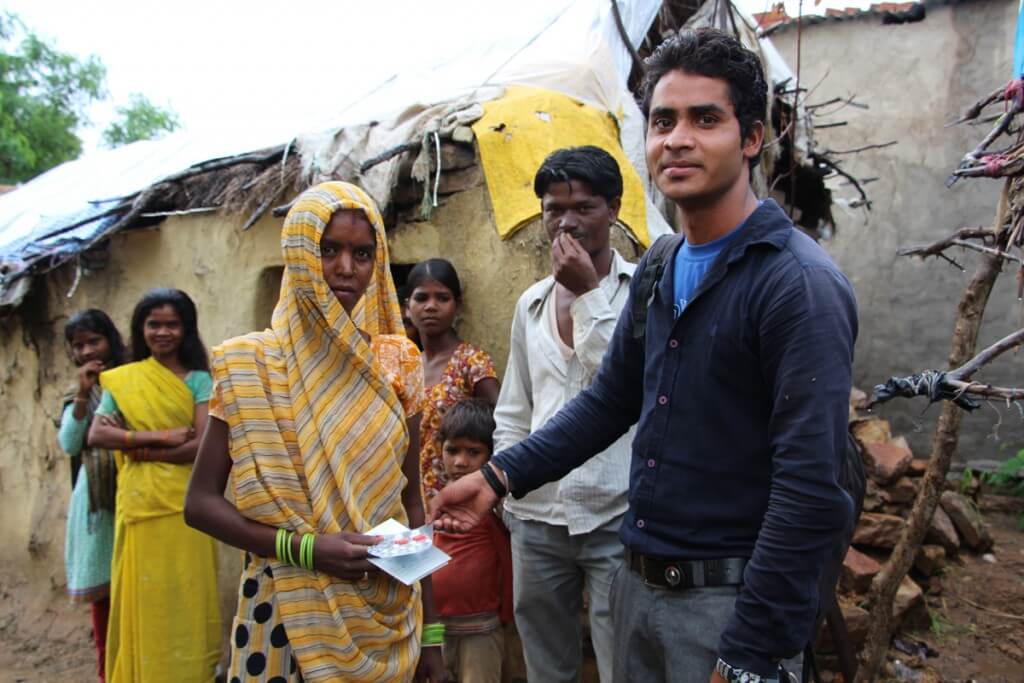
WHERE IS OPERATION ASHA BASED?
In New Delhi, India. We started with 1 centre in 2006, serving a population of 30 000 people, enrolling 6 patients per month. Today we have 289 centres that serve a population of 6.1 million in more than 3 000 slums, across 9 states in India and 2 provinces in Cambodia.
WHAT PROBLEM/S DO YOU ADDRESS?
The challenge in TB treatment lies in the fact that it lasts for 6 to 8 months, and patients must visit a designated treatment centre at least 60 times over 6 months. If the poor have to choose between feeding their families and taking TB treatment, they choose the former, resulting in treatment that is often left incomplete. We developed this unique delivery model to address the failures of resource-limited healthcare systems to ensure treatment adherence, and to expand access to government-provided medications and services by delivering last-mile connectivity.
WHAT IS YOUR INNOVATIVE SOLUTION?
Operation ASHA is an NGO that uses its model to bring TB diagnosis, treatment and prevention to the most disadvantaged populations through a low-cost last-mile pipeline. We partner with the National Government Tuberculosis Programme and facilitate access for patients.
We have several innovative components as part of our model:
Location of care – We operate a network of treatment centres within existing community locales. By strategically establishing centres in existing convenient community locales, such as shops, temples and health clinics, we are able to serve 5 000 to 25 000 people within a 1.5 km radius. So no patient needs to waste time, spend money on transportation or sacrifice wages in order to procure their medicine.
Community mobilisation – We use a whole army of community-based workers to act as the go-between for the public health facility and the patient. These people earn an income, so we are also creating employment. They receive an incentive-based salary: the more patients they find, the better they ensure their compliance, the lower the rates of medication default, the higher their salaries.
Technology – To ensure that TB patients complete their full six-month treatment regimen, we have developed and deployed eCompliance. This is a low-cost biometric attendance system built with a digital Android tablet and a commodity fingerprint reader. The eCompliance software uses the fingerprints of the patient and the provider to track every activity required to deliver high quality TB treatment. Thereafter, every time the patient has to take the medication, both fingerprints are given to generate irrevocable evidence that the meeting took place, and that the medicine was taken. This novel technology is becoming a new revenue stream for our organisation.
WHO’S TEAMING UP TO SOLVE THIS CHALLENGE?
There are about 30 people currently working on this. The founders are Dr Shelly Battra and Sanjeep Ahuja. Dr Shelly is a senior obstetrician and gynaecologist, and advanced laparoscopy surgeon who left her profession to find a new solution to serve the poorest of the poor affected by TB in India.
WHEN DID THE SOCIAL INNOVATION IN HEALTH TEAM VISIT? AND WHAT DID THEY DO?
From 20 to 25 July. Time was spent meeting and engaging with the Operation ASHA team in New Delhi, as well as being immersed in India’s cultural context. We visited the urban slum clinics and also made a trip to the rural tribal villages in Madhya Pradesh to see the work happening on the ground.
For more information, visit http://www.opasha.org/
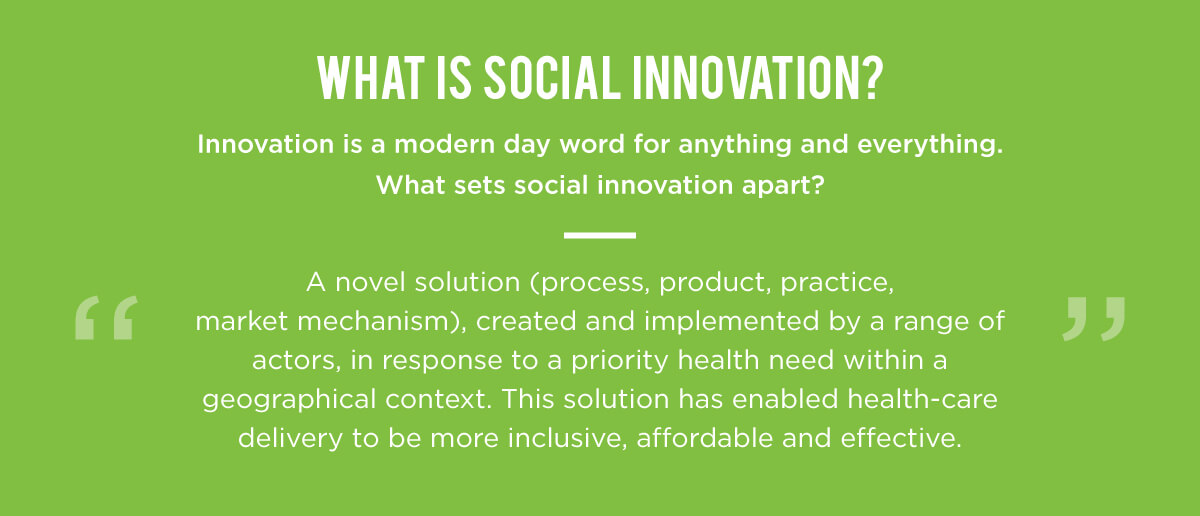
Social innovation is a concept with multiple meanings, which we will unpack one newsletter at a time. What does ‘social innovation in health’ mean to you?
FROM OUR PARTNERS
We are fortunate to collaborate with a global team of change-makers, equally passionate about social innovation in health. Beatrice Halpaap, from the World Health Organization, spoke to us about TDR’s involvement in the Social Innovation in Health Care Initiative (SIHI). She had this to say:
“Social innovation is critical to enhance local communities’ access to technological innovations that can improve healthcare. TDR supports research to identify the best ways to introduce a new tool or intervention, with the aim to improve people’s health in low and middle income countries. With the social innovation in health initiative, we are building upon more than 15 years of engagement in research on community-based interventions.
I find social innovations a fascinating approach. It engages the various actors to share their respective disciplines in order to identify simple solutions to complex problems. It brings the right people together to achieve what none of us would have achieved individually. I believe in the power of team work, partnership and collaboration – to bring synergy and make a change. Working in partnership with the Bertha Centre and the Skoll Centre to enhance social innovation in healthcare is an exciting journey. Their knowledge, experience, dynamism and creativity inspire me. We are looking forward to engage other partners in this global collaboration.
With SIHI, we aim to enhance social innovation in healthcare delivery in the global south. To do so, we seek to engage the various actors in a global collaboration to join efforts in supporting research and strengthening capacity. We see the academic sector as a key player in the promotion of social innovation, in fostering its application through research, and in developing capacity for social innovators and social innovations. Academic institutions have a critical role in facilitating the integration of social innovations with other actors and in transferring this capacity to ‘sister institutions’ in the Global South. In brief, the vision is to see thousands of ‘Bertha-like centres’ working in synergy all over the world and making a big difference.”
In our next newsletter, we will speak to Dr Pamela Hartigan from the Skoll Centre for Social Entrepreneurship.
FROM THE
COMMUNITY
We want to congratulate Prof Carel Ijsselmuiden, Director of COHRED, on a very successful conference in Manilla last month. Read this interesting article on innovation that originated from the discussions.
SOCIAL INNOVATION
IN ACTION
We want to congratulate Prof Carel Ijsselmuiden, Director of COHRED, on a very successful conference in Manilla last month. Read this interesting article on innovation that originated from the discussions.
OUR PARTNERS

